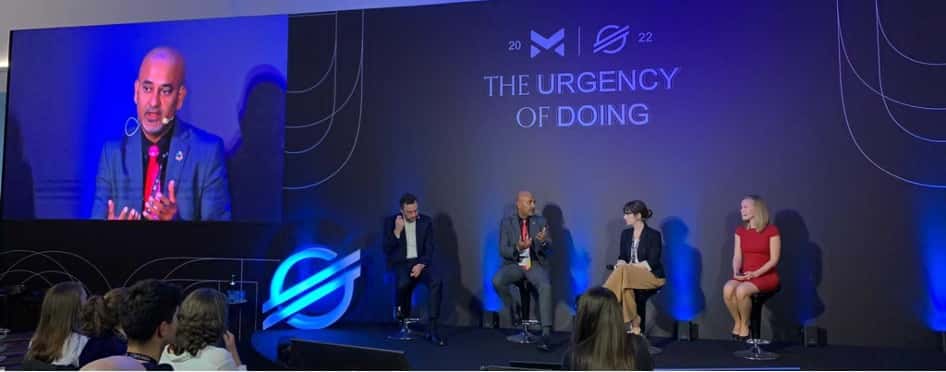UNICC was proud to participate in the Stellar Development Foundation’s Meridian 2022 Conference, called “The Urgency of Doing,» between 11-13 October in Rome, Italy. The Stellar Development Foundation (SDF) is a non-profit organization supporting the development and growth of the open-source Stellar network that supports blockchain technology.
UNICC’s participation highlighted the collaboration between UNICC and UNHCR, to shed light on global development issues and how can blockchain technology help improve the delivery of humanitarian aid.
The distributed ledger or blockchain technology is revolutionary, allowing not only innovative solutions to existing business problems but creating new products and markets altogether. However, for the humanitarian relief sector, lack of tech in the last mile of digital delivery, to Persons of Concern (POC), remains the biggest block in adopting this at scale.
Shashank Rai, Chief Technology Officer, UNICC
Aid organizations rely on physical cash-assistance programs to deliver the hundreds of billions of dollars in aid disbursed each yea, and the need to scale these programs is growing. What if there was a way to disburse aid faster, more transparently, safely, and with fewer barriers at scale? UN Agencies need to open the door to a new way of thinking about delivering humanitarian aid.
The panel – meeting humanitarian needs through digital tools
Shashank Rai, Chief Technology Officer at UNICC spoke at the panel called “Meeting Humanitarian Need through Digital Tools» on 13 October, along with Denelle Dixon CEO of Stellar Development Foundation and Carmen Hett, Treasurer at UNHCR, who spoke about the broader use of technology in humanitarian delivery.
His presentation focused on challenges and opportunities that UNICC is facing in exploring the use of blockchain technology and digital currencies for payments to beneficiaries such as internally displaced populations (IDP) and refugees.
UNHCR works to safeguard the rights and well-being of people who have been forced to flee. Together with partners and communities, they work to ensure that everybody has the right to seek asylum and find safe refuge in another country. This includes refugees, returnees, stateless people, the internally displaced and asylum-seekers. UNHCR’s protection, shelter, health and education has been crucial, healing broken pasts and building brighter futures. UNICC is a key partner to harness digital tools and transformations to successfully deliver aid.
One such digital tool for taking care of refugees is to give them financial aid called ‘cash-based intervention.’ Here, the collaboration between UNICC helps to deliver the blockchain and its digital wallets for refugee reimbursement through cash-based interventions. UNICC is providing the technical intelligence and knowledge on blockchain and associated technologies already, and now is experimenting with the Stellar network platform for optimized services.

The conversations
There were good discussions with the International Rescue Committee (IRC), who was looking to learn more about block chain and Stellar and WFP’s Innovation Lab. What are the problems that the UN system is facing and what are the real gaps in some of the solutions it is embracing?
Shashank was able to contribute his tech and blockchain expertise in the UN system to the conversation, sharing the UNICC experience in implementing blockchain for digital identity across the UN family.
In addition to these questions, there was agreement that cross-border payments with blockchain can facilitate processing, reducing the cost of money movement and moving it expeditiously. Even instantaneously, while old school technologies might take 24 hours before a disbursement arrives in a beneficiary’s bank account.
It’s exceedingly difficult to predict when the next humanitarian crisis is going to take place. The most important thing is to be as ready as we can. Blockchain technology can make it amazingly easy and fast for UN Agencies to exchange financial and informational refugee data.
One of the other big challenges UNICC is looking to address is the difficulty of exchanging refugees’ data from one UN Agency to another (for example, from UNRWA and WFP), but with the swiftness, security and immutability of blockchain it can be done. Similarly, regarding the movement of funds, once funds are managed on the blockchain, people can relax about emergency situations. UN Agencies will be able to quickly move money, so from that point of view, this technology is really bringing efficiency.
Converting cryptocurrency to cash
What remains to be explored in-real-world situations is the ‘cash-out’ from digital wallets. While blockchain based platforms, may move monies at a lower cost and higher speed, eventually Persons of Concern have to ‘cash-out’ digital currency into ‘fiat’ for buying goods and services to meet their needs.
Cost-effective solutions are needed for this last-mile digital delivery. UNICC is supporting UNHCR in experimenting with the Stellar platform for Persons of Concern (POC), to convert the digital dollar (USDC Stable Coin) into fiat currency using services provided by MoneyGram.
This may seem trivial but has many issues as the commercial organisations have to deal with KYC/AML laws of different jurisdictions. For a cross-border refugee already under immense strain, the pay-out is not easy.
UNICC along with its partner humanitarian relief agencies continue to explore this area for cost-effective and digitally-inclusive solutions.
